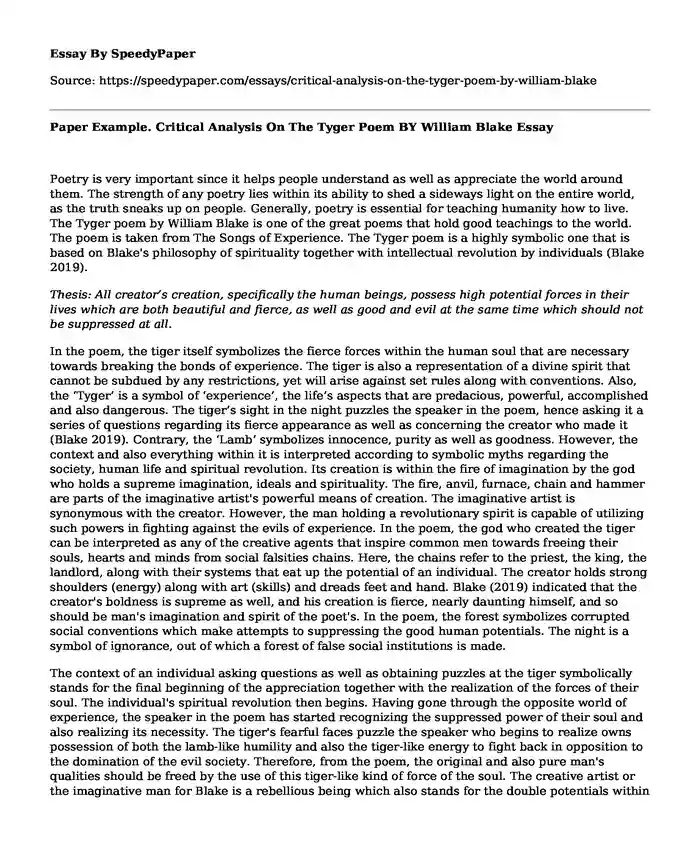
| Essay type: | Critical analysis essays |
| Categories: | Poem Analysis William Blake |
| Pages: | 4 |
| Wordcount: | 840 words |
Poetry is very important since it helps people understand as well as appreciate the world around them. The strength of any poetry lies within its ability to shed a sideways light on the entire world, as the truth sneaks up on people. Generally, poetry is essential for teaching humanity how to live. The Tyger poem by William Blake is one of the great poems that hold good teachings to the world. The poem is taken from The Songs of Experience. The Tyger poem is a highly symbolic one that is based on Blake's philosophy of spirituality together with intellectual revolution by individuals (Blake 2019).
Thesis: All creator’s creation, specifically the human beings, possess high potential forces in their lives which are both beautiful and fierce, as well as good and evil at the same time which should not be suppressed at all.
In the poem, the tiger itself symbolizes the fierce forces within the human soul that are necessary towards breaking the bonds of experience. The tiger is also a representation of a divine spirit that cannot be subdued by any restrictions, yet will arise against set rules along with conventions. Also, the ‘Tyger’ is a symbol of ‘experience’, the life’s aspects that are predacious, powerful, accomplished and also dangerous. The tiger’s sight in the night puzzles the speaker in the poem, hence asking it a series of questions regarding its fierce appearance as well as concerning the creator who made it (Blake 2019). Contrary, the ‘Lamb’ symbolizes innocence, purity as well as goodness. However, the context and also everything within it is interpreted according to symbolic myths regarding the society, human life and spiritual revolution. Its creation is within the fire of imagination by the god who holds a supreme imagination, ideals and spirituality. The fire, anvil, furnace, chain and hammer are parts of the imaginative artist's powerful means of creation. The imaginative artist is synonymous with the creator. However, the man holding a revolutionary spirit is capable of utilizing such powers in fighting against the evils of experience. In the poem, the god who created the tiger can be interpreted as any of the creative agents that inspire common men towards freeing their souls, hearts and minds from social falsities chains. Here, the chains refer to the priest, the king, the landlord, along with their systems that eat up the potential of an individual. The creator holds strong shoulders (energy) along with art (skills) and dreads feet and hand. Blake (2019) indicated that the creator's boldness is supreme as well, and his creation is fierce, nearly daunting himself, and so should be man's imagination and spirit of the poet's. In the poem, the forest symbolizes corrupted social conventions which make attempts to suppressing the good human potentials. The night is a symbol of ignorance, out of which a forest of false social institutions is made.
The context of an individual asking questions as well as obtaining puzzles at the tiger symbolically stands for the final beginning of the appreciation together with the realization of the forces of their soul. The individual's spiritual revolution then begins. Having gone through the opposite world of experience, the speaker in the poem has started recognizing the suppressed power of their soul and also realizing its necessity. The tiger's fearful faces puzzle the speaker who begins to realize owns possession of both the lamb-like humility and also the tiger-like energy to fight back in opposition to the domination of the evil society. Therefore, from the poem, the original and also pure man's qualities should be freed by the use of this tiger-like kind of force of the soul. The creative artist or the imaginative man for Blake is a rebellious being which also stands for the double potentials within any human being (Blake 2019).
Thematically, the poem's intention is making people witness the persona's potentials realization of their soul and for individuals to realize it themselves. The poem clearly indicates that the humankind does not only has the lamb (Christ) like humility but also holds the tiger-like quality for revolution spiritually and also freedom from falsities. The uncommon spelling in "Tyger" is a hint of the special meaning along with emphasis as the uncommon stresses. The utilization of the first stanza as a refrain repeating it with the difference of a single word (dare) is purposely for special emphasis on its symbolism (Blake 2019).
In conclusion, by appreciating together with worshipping nature, individuals are capable of evolving a deeper spirituality sense. It is especially so, given that Blake was a highly religious poet, and he had a feeling that nature was an example of God's handiwork. In the contemporary world, people tend to perceive religion and science as oppositional. Still, it is true that Blake perceived science together with evolving a detailed understanding of the world as a way of getting closer to God and also to better appreciating His power. It is good for the humankind to emulate such kind of a spirit too.
References
Blake, W. (2019). William Blake: Selected Poems. Oxford University Press.
Cite this page
Paper Example. Critical Analysis On The Tyger Poem BY William Blake. (2023, Aug 29). Retrieved from https://speedypaper.net/essays/critical-analysis-on-the-tyger-poem-by-william-blake
Request Removal
If you are the original author of this essay and no longer wish to have it published on the SpeedyPaper website, please click below to request its removal:
- Free Essay on Academic Writing: Academic and Non-Academic Tone
- Essay Sample with a Marketing Analysis of Netflix Company
- Essay Sample: Appraising the Effects of Different Classes of Securities
- The Relationship Between Achilles and Homer - Essay Sample
- Essay Example: Effects of Money Laundering on Our Economy
- Summaries of Chapter One to Five. Free Essay Example
- Characters in Narnia and What they Represent - Free Essay Example
Popular categories




